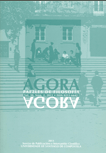El desencuentro entre la Naturphilosophie de Schelling y la Physica de Aristóteles
Contenido principal del artículo
Resumen
Palabras clave:
Detalles del artículo
Referencias
Aristóteles (1848-1889): Aristoteles opera omnia graece et latine, Paris: Didot.
Chamizo, P. (2010): «La solidaridad conceptual entre las diversas teorías científicas», Miscelánea poliana, serie de filosofía 29, ed. On-line: http:// www.leonardopolo.net/revista/mp29.htm#Pedro.
Chamizo, P. (2017): «Lo que dan a entender (y también ocultan) las traducciones de algunas obras», Estudios filosóficos LXVI (2017), 39-57.
Cicerón, M. T. (1917): De natura deorum, Leipzig: Teubner, 1917.
Comte, A. (1839): Cours de philosophie positive IV, Paris: Bachelier, Imprimeur-Libraire.
Diels, H. (1906): Die Fragmente der Vorsokratiker, Berlin: Buchandlung.
Dilthey, W. (1910): Der Aufbau der geshichtlichen Welt in der Geisteswissenschaften, en Gesamelte Schriften VII, Leipzig-Berlin: Teubner, 1927.
Diógenes, L. (1887): Vidas, opiniones y sentencias de los filósofos más ilustres, Madrid: Luis Navarro.
Diosdado, C. (1997): Más allá de la teoría, Sevilla: Kronos.
Florig, O. (2010): Schellings Theorie menschlicher Selbstformierung, Freiburg: Alber.
García, J.A. (1998): Principio sin continuación, Málaga: SPICUM.
Heidegger, M. (1931-38): Überlegungen II-VI (Schwarze Hefte), en Heidegger Gesamtausgabe 94, Frankfurt: Klosterman, 2014.
Heidegger, M. (1954): Was heisst denken?, Tübingen: Niemayer.
Herodoto (1920): Historiae, Cambridge: Hardvard University Press, 1920.
Homero (1920): Ilíada, en Homeri Opera in five volumes, Oxford: University Press, 1920.
Jacobs, W.G. (1993): Gottesbegriff Und Geschichtsphilosophie in der Sicht Schellings, Stuttgart-Bad Canstatt: Frommann Holzboog.
Kant, I. (1975): Zum ewigen Frieden. Ein philosophischer Entwurft, en Immanuel Kants Gesammelten Werken VIII, Berlin: Akademieausgabe, disponible en https://korpora.zim.uni-duisburg-essen.de/kant/aa08/341.html.
Kirk-Raven (1957): The presocratic philosohper, Cambridge: University Press.
Koyré. A. (1943): Traduttore-Traditre: A propos de Copernic et Galilée (trad. al español en en Estudios de historia del pensamiento científico, México, siglo XXI, 1973). https://doi.org/10.1086/347792
Krings, H. (1985): “Natur als Subjekt. Ein Grundzug der spekulativen Physik Schellings”, en Heckmann-Krings-Meyer (eds.), Natur und Subjektivität, Bad Cannstatt, 1985.
Leyte, A. (2007): «Vom Hyle zur Meterie: Die Geschichte eines Missverständnisses», Journal of the Faculty of Letters, 32.
Platón (1513): Omnia Platonis Opera, Venezia: Aldo. Versión on-line: http://interclassica.um.es/seneca/SigloXVI/Omnia_Platonis_Opera/index.html#/4/.
Ricoeur, P. (1983): Temps et récit, Paris: Seuil.
Ricoeur, P. (2002): «Hermenéutica y crítica de las ideologías», en Del texto a la acción: ensayos de hermenéutica II, pp. 307-347, México: FCE.
Roldán, C. (1997): Entre Casandra y Clío. Una historia de la filosofía de la historia, Madrid: Akal, 2005.
Rorty, R. (1979): Phylosophy and the Mirror of Nature, Princeton: University Press, 2018.
Schelling, F.W.J. (1796-7): Abhandlungen zur Erläuterung des Idealismus der Wissenschaftslehre, en Schellings Sämmtliche Werke I, Stuttgart: Cotta, 1856-61.
Schelling, F.W.J. (1797a): Einleitung zu den Ideen zu einer Philosophie der Natur, en Schellings Sämmtliche Werke II, Stuttgart: Cotta, 1856-61.
Schelling, F.W.J. (1797b): Ideen zu einer Philosophie der Natur, en Schellings Sämmtliche Werke II, Stuttgart: Cotta, 1856-61.
Schelling, F.W.J. (1798a): Erster Entwurft eines Systems der Naturphilosophie, en Schellings Sämmtliche Werke III, Stuttgart: Cotta, 1856-61.
Schelling, F.W.J. (1798b): Von der Weltseele, eine Hypothese der höheren Physik, en Schellings Sämmtliche Werke II, Stuttgart: Cotta, 1856-61. Schelling, F.W.J. (1812): Denkmal der Schrift von den Gottlichen Dingen, Tubinga: Cotta.
Schelling, F.W.J. (1841ss): Philosophie der Offenbarung, en Schellings Sämmtliche Werke XIII, Stuttgart: Cotta, 1856-61.
Simplicio (1882-95): In Aristotelis Physica Commentaria, en Comentaria in Aristotelem Graeca IX-X, Berlin: Diels, 1882-95.
Zimmermann, R. E. (1996): «Freiheit als Grund des Wirklichen - Zur Entwurfstruktur Schellingscher Ontologie», en Baumgartner-Jacobs (eds.) Schellings Weg zur Freiheitsschrift. Legende und Wirklichkeit, StuttgartBad Cannstatt: Frommann-Holzboog (=Schellingiana 5).







